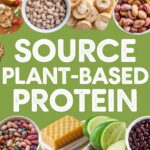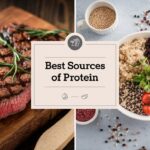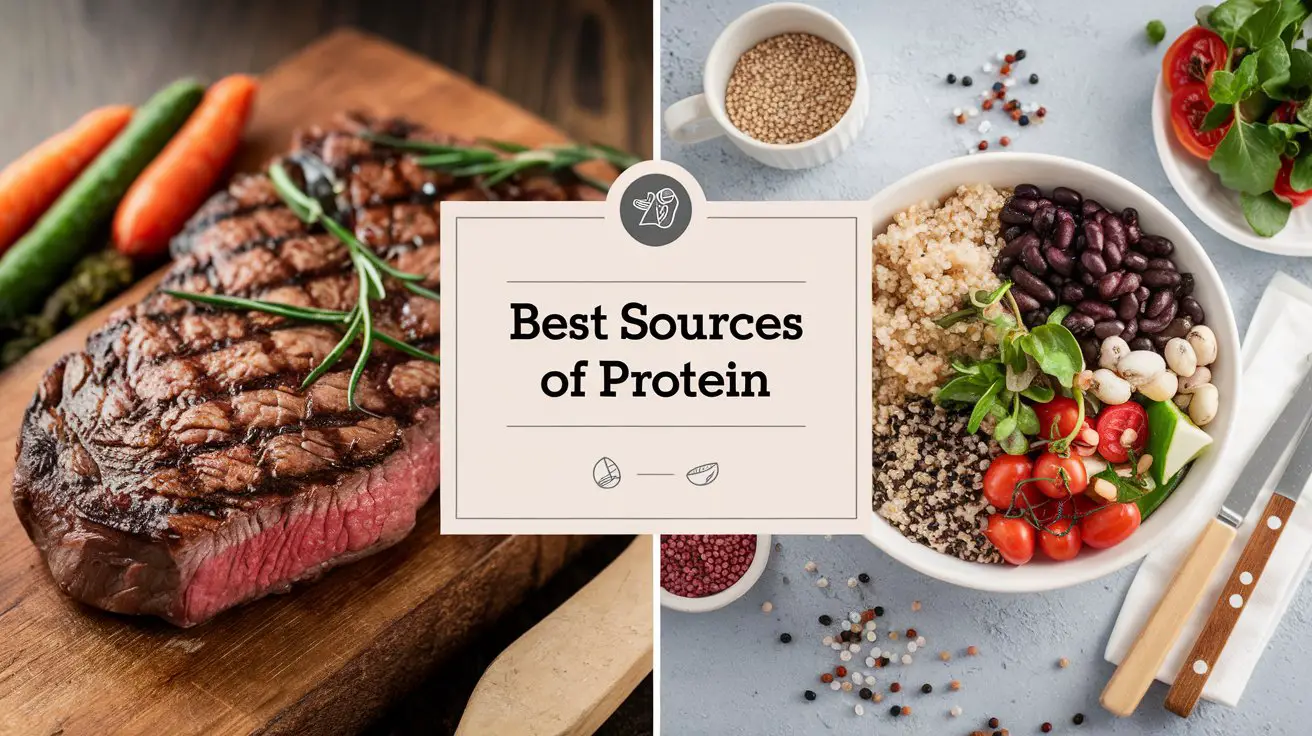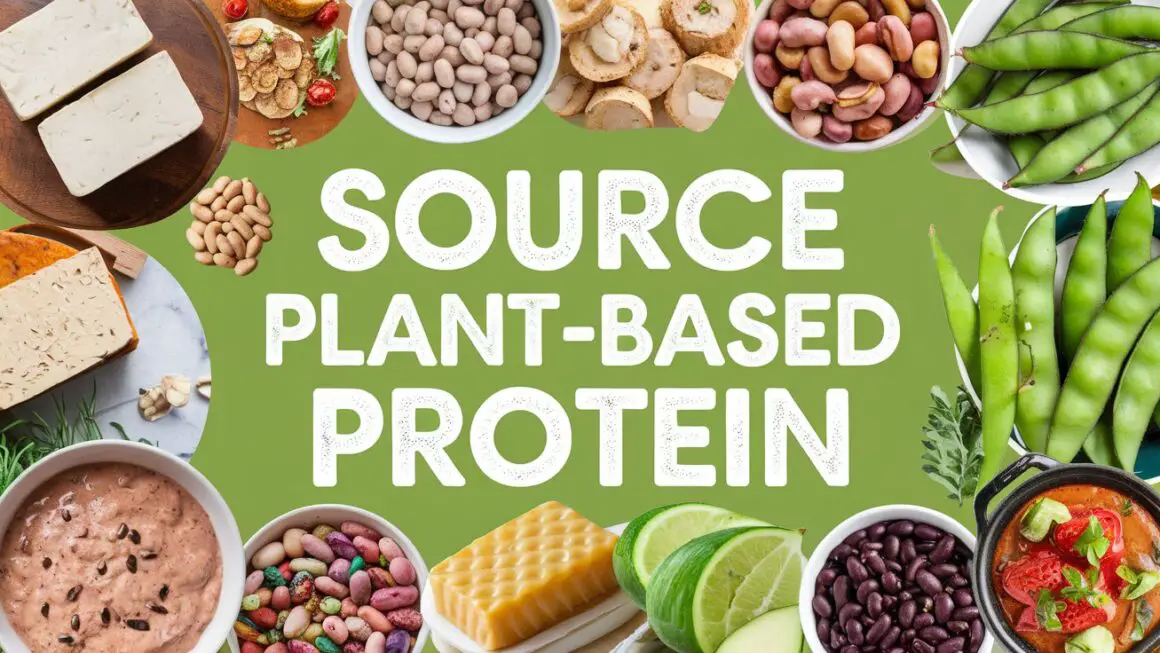1. Introduction
1.1 What is Protein and Why is it Important?
Protein is a vital macronutrient that plays a crucial role in building and repairing tissues, producing enzymes and hormones, and supporting overall bodily functions. It is essential for maintaining muscle mass, promoting healthy skin, hair, and nails, and aiding in immune system function.
1.2 Overview of Protein Sources
Proteins can be sourced from both animals and plants. Each type offers different benefits, and the choice of protein source often depends on dietary preferences, ethical considerations, and nutritional needs.
2. Types of Protein Sources
2.1 Animal-Based Protein Sources
Animal-based proteins are considered complete proteins, as they contain all nine essential amino acids that the body cannot produce on its own. Common animal-based protein sources include meat, fish, eggs, and dairy products.
2.2 Plant-Based Protein Sources
Plant-based proteins come from sources like legumes, nuts, seeds, and whole grains. While most plant proteins are incomplete, meaning they lack one or more essential amino acids, combining different plant sources can provide a complete amino acid profile.
2.3 Comparison of Animal and Plant Proteins
Animal proteins generally have a higher biological value, meaning they are more easily absorbed and utilized by the body. However, plant proteins offer additional health benefits, such as fiber, vitamins, and antioxidants.
3. Animal-Based Protein Sources
3.1 Meat (Beef, Chicken, Pork)
Meat is a rich source of high-quality protein, iron, and B vitamins. Beef, chicken, and pork are among the most commonly consumed meats, each offering unique nutritional benefits.
3.2 Fish and Seafood
Fish and seafood are excellent sources of protein and omega-3 fatty acids, which are beneficial for heart health. Fatty fish like salmon and mackerel are particularly high in these essential fats.
3.3 Eggs
Eggs are one of the most versatile and complete sources of protein. They contain all essential amino acids and are also rich in vitamins D and B12, making them a staple in many diets.
3.4 Dairy Products
Dairy products like milk, cheese, and yogurt are not only high in protein but also provide calcium, which is essential for bone health. Greek yogurt, in particular, is a popular high-protein choice.
4. Plant-Based Protein Sources
4.1 Legumes (Beans, Lentils, Peas)
Legumes are a powerhouse of plant-based protein, fiber, and essential nutrients. They are an excellent option for vegetarians and vegans, offering versatility in various dishes.
4.2 Nuts and Seeds
Nuts and seeds are convenient sources of protein, healthy fats, and micronutrients like magnesium and vitamin E. Almonds, chia seeds, and hemp seeds are particularly protein-rich options.
4.3 Whole Grains (Quinoa, Brown Rice)
Whole grains like quinoa and brown rice provide a balanced source of protein, carbohydrates, and fiber. Quinoa is unique among grains as it is a complete protein, containing all essential amino acids.
4.4 Vegetables (Spinach, Broccoli)
Certain vegetables, such as spinach and broccoli, offer a surprising amount of protein per serving. While they are not primary protein sources, they contribute to overall protein intake, especially in plant-based diets.
5. Protein Supplements
5.1 Whey Protein
Whey protein, derived from dairy, is one of the most popular supplements, especially among athletes and bodybuilders. It is a complete protein, easily absorbed, and available in various forms like concentrates, isolates, and hydrolysates.
5.2 Plant-Based Protein Powders
For those avoiding dairy, plant-based protein powders made from sources like pea, hemp, and brown rice offer a vegan alternative. They can be just as effective as whey protein when combined with a varied diet.
5.3 Protein Bars and Snacks
Protein bars and snacks provide a convenient way to boost protein intake on the go. They are available in both animal-based and plant-based options, catering to different dietary preferences.
6. How Much Protein Do You Need?
6.1 Factors Influencing Protein Requirements
Protein needs vary based on factors like age, gender, activity level, and overall health. Athletes, pregnant women, and the elderly may require higher protein intake to support their specific needs.
6.2 Recommended Daily Intake
The recommended daily intake of protein is approximately 46 grams for women and 56 grams for men, though this can vary. It is important to spread protein consumption throughout the day to maximize absorption and muscle synthesis.
7. Health Benefits of Protein
7.1 Muscle Growth and Repair
Protein is essential for muscle growth and repair, making it crucial for athletes and those engaging in strength training. Consuming protein-rich foods post-workout helps rebuild muscle fibers and promote recovery.
7.2 Weight Management
High-protein diets have been shown to aid in weight management by promoting satiety, reducing hunger, and helping maintain muscle mass during weight loss.
7.3 Metabolism Boost
Protein has a higher thermic effect compared to carbohydrates and fats, meaning the body burns more calories digesting and metabolizing protein. This can contribute to a slight increase in metabolism.
8. Protein for Different Diets
8.1 High-Protein Diets (e.g., Keto, Paleo)
High-protein diets like Keto and Paleo emphasize protein as a primary macronutrient while limiting carbohydrates. These diets can be effective for weight loss and muscle building but may not be suitable for everyone.
8.2 Vegetarian and Vegan Diets
Vegetarian and vegan diets rely on plant-based proteins, which may require careful planning to ensure all essential amino acids are consumed. Combining different protein sources can help achieve a complete amino acid profile.
8.3 Protein for Athletes
Athletes often require higher protein intake to support increased muscle repair and growth. Timing protein intake around workouts and consuming a variety of protein sources is key for optimal performance.
9. Common Myths About Protein
9.1 “Too Much Protein is Bad for You”
While excessive protein intake can strain the kidneys in individuals with pre-existing kidney conditions, most healthy people can safely consume high levels of protein without adverse effects.
9.2 “Animal Protein is Superior to Plant Protein”
Although animal proteins are often considered superior due to their complete amino acid profile, plant proteins can be equally effective when combined properly in a balanced diet.
9.3 “Protein Supplements are Necessary”
Protein supplements can be convenient, but they are not necessary for everyone. A well-rounded diet can provide sufficient protein without the need for supplements.
10. Expert Insights
10.1 Quotes from Nutritionists
Nutritionists often emphasize the importance of balanced protein intake from diverse sources to ensure overall health and wellness. For example, Dr. Jane Smith notes, “Incorporating both animal and plant proteins can provide a range of nutrients that support overall health.”
10.2 Case Studies on Protein Intake
Case studies show that individuals who consume a balanced mix of animal and plant proteins tend to have better health outcomes compared to those who rely solely on one type of protein.
11. Future Outlook
11.1 Emerging Trends in Protein Sources
The future of protein consumption may see a shift towards sustainable and alternative protein sources, such as lab-grown meat and insect-based proteins, driven by environmental concerns and growing demand for plant-based diets.
11.2 Sustainable Protein Production
As the global population continues to grow, sustainable protein production will become increasingly important. Innovations in agriculture, such as vertical farming and plant-based meat alternatives, are paving the way for more sustainable protein sources.
12. Conclusion
12.1 Recap of Key Points
Protein is an essential nutrient that supports numerous bodily functions, and it can be sourced from both animal and plant-based foods. A balanced approach to protein intake, considering individual dietary preferences and needs, is crucial for overall health.
12.2 Final Thoughts
Whether you choose animal-based, plant-based, or a mix of both, ensuring adequate protein intake is key to maintaining a healthy lifestyle. As new protein sources and trends emerge, staying informed will help you make the best dietary choices for your health and the planet.














